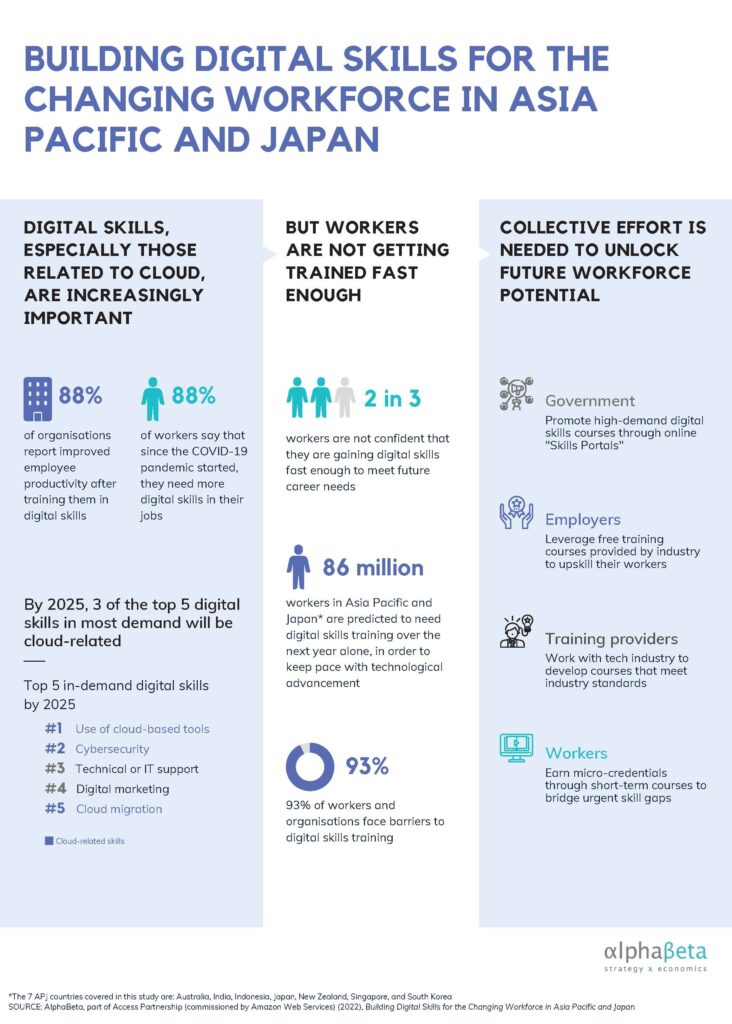
(Source – AWS)
Digital skills training for the evolving workforce a prerogative in Asia Pacific
Every organization talks about upskilling and reskilling its workforce. But the reality is, digital skills are not something that can be picked up in a few days or weeks. Organizations need to ensure they are investing in their employees to remain productive but are they really doing so?
According to a study by Alpha Beta commissioned by Amazon Web Services (AWS), an estimated 86 million people across the seven APJ countries will need to undertake digital skills training over the next year alone. However, while 97% of organizations understand the need to train their workers on digital skills, only 29% are implementing to do so.
Today, digital skills are a necessity for most employees. The demand increased dramatically during the COVID-19 pandemic as more interactions shifted online and the cloud became a vital tool for organizations to digitally transform to keep up with the new normal.
The Building Digital Skills for the Changing Workforce report also showed that 88% of workers felt that the need for digital skills increased when the pandemic started. What’s more concerning is that two in three workers are not confident that they are gaining digital skills fast enough to meet future career needs.
In fact, with more businesses more their services to the cloud and adopting new technologies, three of the top five skills in demand by 2025 will be cloud-related. The ability to use cloud-based tools, like cloud developer tools, cloud-based communication software, accounting software, and customer relationship management (CRM) software will be key for employees.
Apart from cloud-related skills, cybersecurity is the second most in-demand skills area, with specific requirements for skills in developing and deploying protocols and tools for digital ethics and security. The increasing growth of data also requires employees to have a stronger understanding of data loss and data privacy regulations.
“While it is not a silver bullet, implementing digital skills training can boost employee engagement and retention,” said Genevieve Lim, Director for APAC at AlphaBeta.
Lim explained that the study showed significantly more benefits of worker retraining instead. This included avoiding severance and hiring costs, productivity gains from reskilling as well as high job satisfaction among employees, which in turn can boost organizational resilience.

Digital Skills APJ Report. (Source – AWS)
Implementing digital skills
As such, with digital skills a prerogative for organizations, why are companies not implementing them fast enough?
The research showed that the two most common barriers to this are the limited awareness of training options available and a lack of time to pursue the training. This shows a training shortfall that could hinder growth in the workforce and entire economies.
And this is where big tech companies like AWS come in. Deeply committed to addressing this challenge, AWS has launched several programs around the region to help reskill and upskill employees.
“We have trained over 3.5 million individuals across the Asia Pacific and Japan with cloud skills since 2017, including over 100,000 individuals in Singapore and over 300,000 individuals in Indonesia,” mentioned Emmanuel Pillai, Head of Training and Certification, the Asia Pacific and Japan (APJ) at AWS.
One of the programs is AWS re/Start, a no-cost, full-time, 12-week course that uses real-world, scenario-based exercises, labs, and coursework to build skills and workforce opportunities for unemployed or underemployed people who are seeking a career in cloud computing. AWS re/Start is currently available in over 39 countries globally, including Australia, New Zealand, India, and Malaysia.
For employers, AWS helps build digital skills within their teams through programs like AWS Skills Guild, a comprehensive skills enablement program that builds cloud fluency. It has been rolled out with customers like the National Australia Bank (NAB), Korean Air, and Globe Telecom.
Another program is Cloud Ready SG, a holistic digital and cloud technology skilling program developed in collaboration with the Singapore Government and AWS, designed to drive inclusive growth in training the current and future Singapore workforce.
Building a diverse and skilled global community for the digital future
“With digital skills, it’s not a point in time activity. It is something where once a skill is acquired, it needs to be implemented. If an employee does not have the opportunity to try out that skill, then there is a component of that skill that is lost. But more importantly, there is a lot of free training available. So, it is not costly to invest in training. If a company does not invest in training their employees, they would not be able to innovate and there would be competitive disadvantages as well,” said Pillai.
More importantly, Pillai also highlighted the need to build a continuous journey and a culture of continuous learning to keep updated on the latest technologies.
“The churn rate of digital skills that are needed is going to be a lot higher than the churn rate of employees. The average employee takes about one to two years to gain full productivity in their job roles. But skills are evolving rapidly and quicker than that. Therefore, the approach to tackle this problem is not around firing and hiring but focusing on training and accelerating its pace for employees,” added Lim.
For Peter Moore, Regional Managing Director of AWS Worldwide Public Sector in the Asia Pacific and Japan, as organizations continue to undergo digital transformation at an accelerating rate, investing in digital skills training has become imperative for achieving business goals. He also pointed out that some countries have taken the first step, but more initiatives are needed to bridge the digital skills gap.
“To build a diverse and ready workforce, governments, training providers, and employers must work together to provide more accessible and targeted skills training. Our goal is to help people—from beginners to seasoned IT professionals—gain new cloud computing skills, and we are committed to collaborating with industry and governments to solve the digital skills shortage by encouraging a culture of lifelong learning,” commented Moore.
READ MORE
- The criticality of endpoint management in cybersecurity and operations
- Ethical AI: The renewed importance of safeguarding data and customer privacy in Generative AI applications
- How Japan balances AI-driven opportunities with cybersecurity needs
- Deploying SASE: Benchmarking your approach
- Insurance everywhere all at once: the digital transformation of the APAC insurance industry


